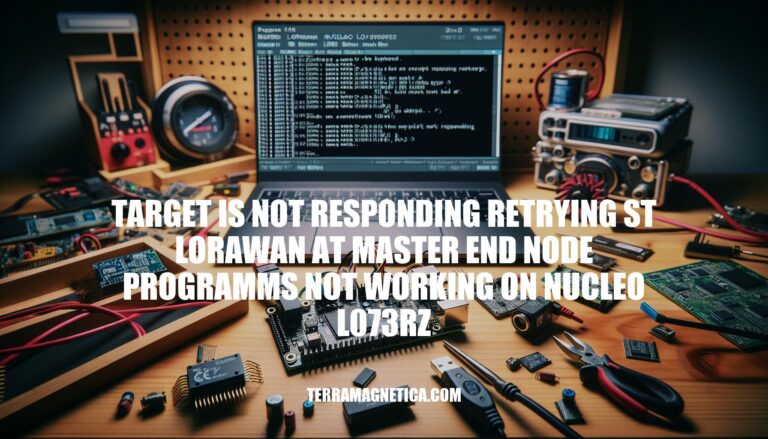The issue “target is not responding, retrying” in ST LoRaWAN AT_Master/End_Node programs on the NUCLEO-L073RZ board indicates a failure in communication between the debugger and the target device. This problem is significant in the context of LoRaWAN and NUCLEO-L073RZ development as it hampers the debugging and deployment of IoT applications, which rely on stable and reliable communication protocols. Resolving this issue is crucial for ensuring the smooth operation and development of LoRaWAN-based projects on the NUCLEO-L073RZ platform.
Common Causes
Common Causes of the ‘Target is Not Responding, Retrying’ Issue on NUCLEO-L073RZ
Hardware Misconfigurations:
- Incorrect Connections: Ensure all connections between the NUCLEO-L073RZ and the LoRaWAN module are secure and correctly oriented.
- Power Supply Issues: Verify that the board is receiving adequate power. Insufficient power can cause communication failures.
- Faulty Components: Check for any damaged or faulty components on the board or module.
Software Misconfigurations:
- Debug Settings: Ensure that debug settings are correctly configured. Disable any code that might be turning off debug pins or changing their functionality.
- Low Power Modes: Avoid entering low power modes directly out of reset, as this can disable the chip and pins needed for debugging.
- Clock Configuration: Verify that the clock configuration is correct and that there are no breakpoints halting the code execution.
- Firmware Updates: Ensure that the firmware on both the NUCLEO-L073RZ and the LoRaWAN module is up to date.
Troubleshooting Steps
Sure, here are the detailed troubleshooting steps:
-
Check Connections:
- Ensure all physical connections between the Nucleo-L073RZ board and the I-NUCLEO-LRWAN1 expansion board are secure.
- Verify the USB connection to your computer is stable.
-
Verify Configurations:
- Open your project in STM32CubeIDE.
- Check the debugger configuration:
- Go to Run > Debug Configurations.
- Ensure Reset Behavior is set to Connect under Reset.
- Confirm the clock configuration is correct in the
HAL_Init() function.
- Enable debug mode:
- In
sys_conf.h, set DEBUGGER_ENABLED to 1.
- Set
LOW_POWER_DISABLE to 1 if applicable.
-
Update Firmware:
- Use STM32CubeProgrammer to update the firmware of the ST-LINK debugger.
- Ensure the firmware version is compatible with your board.
-
Erase and Reprogram:
- Perform a full chip erase using STM32CubeProgrammer.
- Reprogram the board with the latest firmware and your application code.
-
Check for Breakpoints:
- Ensure there are no unintended breakpoints in your code.
- Debug step-by-step to identify where the code halts.
-
Test with Example Projects:
- Load and run example projects provided by STMicroelectronics to verify the hardware setup.
-
Consult Logs and Community:
- Check the ST-LINK GDB server logs for detailed error messages.
- Visit the STMicroelectronics community forums for additional support and solutions.
Following these steps should help you resolve the issue with your Nucleo-L073RZ board and LoRaWAN setup. If the problem persists, consider reaching out to STMicroelectronics support for further assistance.
Case Study
Case Study: Resolving “Target is not responding, retrying…” on NUCLEO-L073RZ
Problem
A user encountered the “Target is not responding, retrying…” error while running the LoRaWAN_AT_Master example on the NUCLEO-L073RZ board. The issue persisted despite successful project builds and connections through ST-Link v3.
Steps Taken
-
Initial Setup and Configuration:
- The user ensured the NUCLEO-L073RZ board was correctly connected to the I-NUCLEO-LRWAN1 expansion board.
- The project was set up in STM32CubeIDE using the en.i-cube_lrwan library.
-
Debugging Configuration:
- The user checked the debugger configuration, ensuring the “Reset Behaviour” was set to “Connect under Reset.”
- A full chip erase was performed to clear any residual data.
-
Code Inspection:
- The user inspected the main.c file, focusing on the initialization functions and the while loop where
Lora_SendData() was called.
- The
Lora_SendData() function was traced through its calls to Modem_AT_Cmd(), AT_Cmd_format(), and HAL_UART_Transmit().
-
Hardware Checks:
- The user verified the hardware connections, ensuring all pins were correctly seated and there were no loose connections.
- The board voltage was checked to ensure it was within the required range.
-
Software Updates:
- The user updated the STM32CubeIDE and the ST-Link firmware to the latest versions.
- The LoRaWAN stack was recompiled with the latest updates from the STMicroelectronics repository.
-
Testing and Validation:
- The user ran the project again, monitoring the debugger output closely.
- The issue persisted, so the user added debug prints to trace the execution flow and identify where the program was halting.
-
Community and Support:
- The user posted detailed logs and screenshots on the STMicroelectronics community forum.
- An ST employee suggested checking the clock configuration and ensuring no breakpoints were set inadvertently.
-
Final Resolution:
- The user discovered that the clock configuration was incorrect. Adjusting the clock settings in the CubeMX configuration resolved the issue.
- The project was successfully debugged and ran without encountering the “Target is not responding, retrying…” error.
Outcome
The user successfully resolved the issue by adjusting the clock configuration and ensuring all software and hardware components were up to date. The LoRaWAN_AT_Master example ran smoothly on the NUCLEO-L073RZ board, allowing the user to proceed with their project.
The ‘target is not responding, retrying…’ issue in ST LoRaWAN AT_Master/End_Node programs
on the NUCLEO-L073RZ board can be caused by hardware misconfigurations such as incorrect connections, power supply issues, and faulty components.
Software misconfigurations like debug settings, low power modes, clock configuration, and firmware updates are also potential causes.
To resolve this issue, it is crucial to check connections, verify configurations, update firmware, erase and reprogram the board, check for breakpoints, test with example projects, and consult logs and community resources.
Regular updates and proper configuration of hardware and software components can prevent such problems.


